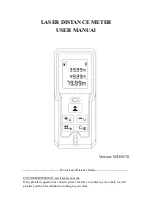
Equipment Setup
The pycnometer should be checked to make sure it is operating properly be-
fore actual analyses are attempted. The remainder of this chapter describes
how to install the pycnometer and verify operation.
Selecting the Location
When selecting the location of the pycnometer, keep the following in mind:
The pycnometer performs best in a constant temperature environment.
It should be installed on a workbench about 36 in. high in a location free
of drafts from either a forced-air heating or cooling system.
The slots in the baseplate, which provide ventilation, should not be blocked.
The pycnometer should not be placed near a window; exposure to sunlight
may cause the temperature to vary.
Gas Requirements
The pycnometer uses helium (99.995% pure or better) to provide rapid, accu-
rate analyses. The cylinder containing helium must be fitted with a gas regu-
lator and the regulator set for 15 to 23 psig (we recommend 20-22 psig). In
no instance should the pressure input to the pycnometer be greater than 23
psig. Excessive pressures waste gas due to a protection device contained in
the pycnometer that vents the pycnometer to atmospheric pressure if pressure
exceeds 25 psig.
Minimum recommended helium tank pressure is 200 psig.
Installing the Power Cord
Locate the female end of the power cord and insert it into the power entrance
on the rear panel of the instrument.
The power cord supplied with your instrument is a shielded cord (as are
the optional RS-232 and printer cords). If you alter or replace any of
these cords with non-shielded cords, your instrument may no longer con-
form to the European Union Council Directives (CE Mark).
AccuPyc 1330
Equipment Setup
September 1996
2-3
Summary of Contents for AccuPyc 1330
Page 1: ...AccuPyc 1330 Pycnometer Operator s Manual V3 03 Part No 133 42808 01 January 2005 ...
Page 6: ...CHAPTER 1 GENERAL INFORMATION Organization of the Manual Conventions Equipment Description ...
Page 83: ...CHAPTER 6 ORDERING INFORMATION ...
Page 86: ...APPENDIX A CHANGING THE ANALYSIS MODULE ...
Page 92: ...APPENDIX B ANALYSIS THEORY ...
Page 96: ...APPENDIX C CALIBRATION THEORY ...
Page 99: ...APPENDIX D FORMAT OF TRANSMITTED DATA ...
Page 108: ...APPENDIX E PRINTER CHARACTER SET ...
Page 111: ...INDEX ...
















































